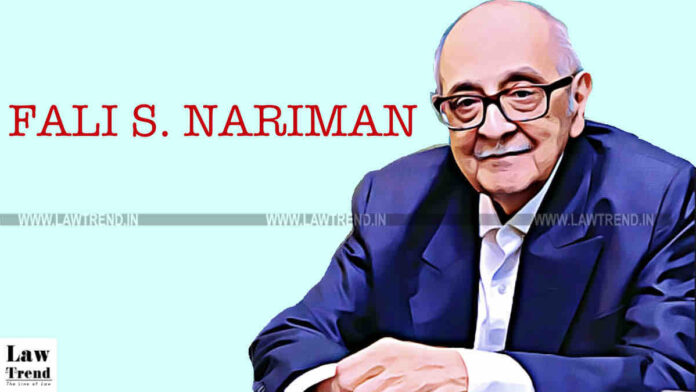Noted jurist Fali S Nariman emphasised on Friday the need of dissent in judiciary, saying it sends out a message of assurance to curious public that the highest court of the country is in robust health and doing its allotted task well.
Nariman regretted a lack of dissent in the recent judgment delivered by a five-judge constitution bench of the Supreme Court unanimously upholding the Centre’s decision to abrogate Article 370 that bestowed special status on the erstwhile state of Jammu and Kashmir.
The top court also directed restoration of statehood for the present-day union territory of Jammu and Kashmir “at the earliest” and assembly elections there by September 30, 2024.

He was speaking as the guest of honour at the 28th Justice Sunanda Bhandare Memorial Lecture.
“Yes, I do believe it (dissent) is needed because often a dissent in a bench of judges, whether of 3, 5, 7 or 9, is not just a safety valve, it also sends a message of assurance to the ever curious and ever anxious general public that the highest court is in robust health and doing its allotted task well,” Nariman said.
On the Article 370 judgment, he said, on reading about the very exhaustive and learned judgment on Kashmir recently handed down by a constitution bench of five judges, his regret was that there was no dissent.
“A dissent would have made no difference to the outcome but still it would have helped the not so well informed general public to better understand and appreciate the contours of this very unique and somewhat complicated case about India’s northern-most state.
“And it is always necessary to recall what an American judge very wisely said a dissent may salvage for tomorrow a legal principle that has been omitted or forgotten today’,” he said.
He also referred to a book written by Justice Rohington Nariman a few years ago in two volumes about dissenting judges and their role in the world.
Supreme Court judge, Justice B V Nagarathna, who is likely to become the 54th and the first woman Chief Justice of India, delivered the 28th Justice Bhandare lecture on the “Role of Judiciary in Empowerment of Indian Women”.
Speaking of Justice Nagarathna, Nariman said besides her legal knowledge, he also admired that in important constitutional cases she has shown that she is able, ready and willing to dissent from the views expressed by other colleagues on the bench.
Delhi High Court Acting Chief Justice Manmohan said Justice Nagarathna’s journey in the profession has been remarkable and she has been an inspiration for many men and women in the profession.
The role of the judiciary in empowerment of the marginalised, especially women, is in a stage of constant evolution, he said, adding “Today, we find ourselves in an advanced stage of equality jurisprudence”.
Also Read
“The topic chosen by Justice Nagarathna was well suited for the times we live in, especially when the apex court has transformed the constitutional vision of gender equality into a reality. The landmark decision granting permanent commission to women in the armed forces is a proud illustration,” Justice Manmohan said.
Speaking on the work done by Justice Bhandare in her lifetime, he said she was a true pioneer in the field of gender equality and women empowerment.
She led by example and, most significantly, her instrument of change was law, Justice Manmohan said, adding that Justice Bhandare would not let her vision be cluttered by a haze of prevailing bias and preconceived notions.
“With robust commonsense and brisk pace, she dispensed judgments with clear focus on solutions. It is a great quality which any judge must have.
“Even when she was struck with a major illness, she continued to preside over as a judge and despite pain and discomfort she presided over the bench and delivered many memorable judgments,” he said.







